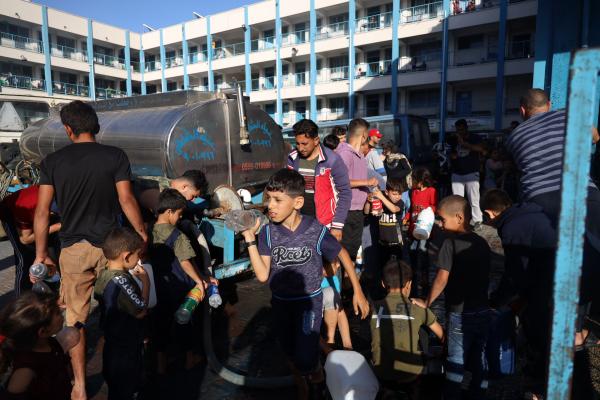Israeli Attacks on Gaza Leave 800,000 Palestinians Without Piped Water
Nearly 50 Percent Of Water Network Damaged In 11 Days
25 May 2021 by The Water Diplomat
Tel Aviv, Israel

Around 800,000 people in Israel-occupied Gaza lack regular access to piped water in the wake of the 11-day fighting that damaged around 50% of the water network, says the UN Office for the Coordination of Humanitarian Affairs (OCHA), quoting information from Gaza's ministry of public works and housing.
Following the announcement of the ceasefire on 21 May, the OCHA announced the immediate release of $22.5 million in aid allocated from the Central Emergency Response Fund (CERF) and the Occupied Palestinian Territory Humanitarian Fund.
The statement said that the hostilities "have caused serious damage to vital civilian infrastructure in Gaza, affecting water, sanitation and hygiene (WASH) services for hundreds of thousands of people".
“I welcome the ceasefire and I reiterate my call on all parties to the hostilities to allow for emergency humanitarian relief distribution, and for civilians to purchase food and water, seek medical care and attend to other emergency needs," said Mark Lowcock, the UN’s under-secretary-general for humanitarian affairs and emergency relief coordinator.
In a separate report, UNICEF estimates that 325,000 people, including 165,000 children, require humanitarian assistance to access safe drinking water and basic sanitation. "Essential infrastructure – including groundwater wells and reservoirs, desalination and wastewater plants, water delivery networks and pumping stations – have sustained significant damage," said UNICEF's executive director, Henrietta Fore.
UNICEF says it is working with water authorities to repair infrastructure and procure 200,000 litres of fuel to "ensure the operation of the three main desalination plants, thereby ensuring access to safe water".
Aid agency Oxfam also announced plans to deliver immediate WASH assistance to an initial group of 282,762 people by providing clean water by truck as well as bottled water, jerry cans to store water, and repairing sanitation facilities at schools and other areas. "We are also distributing hygiene items like soap and personal protective equipment and promoting the importance of good hygiene," said the statement.
Since the ceasefire was announced, most of the more than 77,000 Palestinians displaced by the violence are understood to have returned home. However, OCHA estimates that around 1,000, whose homes were destroyed or badly damaged, remain in emergency shelters.
In a report just published as part of its "Water Under Fire Series", and compiled prior to the latest round of violence, UNICEF identifies 95 attacks against 142 WASH structures in the State of Palestine since 2019. The report notes that constraints on the entry of fuel into Gaza limits electricity output by the Gaza Power Plant, leading to a deterioration in water quality and outages at sewage pumping stations as well as drops in water availability to less than 50 litres per person per day, which is less than half the WHO minimum daily water requirement.
Photo credit: UNICEF
